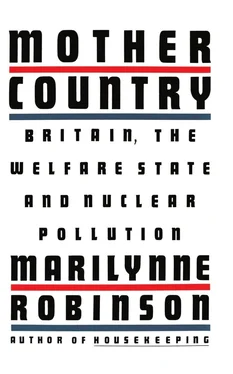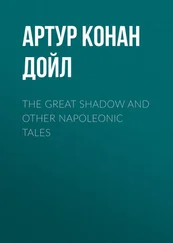If the spectacle of high-mindedness did in fact create norms and refine standards of behavior, Britain, so replete with high-mindedness, would not be profiting from a special willingness to dump toxins over its landscape. Presumably Japan ships its detritus from the other side of the world because no one nearer home can be found who is willing to accommodate it. So Britain’s position in the world is apparently rather singular. Its exceptional moral facility actually corresponds to an exceptional willingness to expose its population to harm and hazard others will not bear. (The British government would argue that these wastes pose little risk — that is inevitably the defense — but then the preference of sophisticated nations for dumping them abroad is hard to account for, as is their willingness to pay generously to be rid of them, the source of the very profitability by which, in the mind of the British government, this industry is justified.)
Isuppose our situation in America is essentially colonial. As colonists we were the groundlings of other societies, and we are still overawed by the squire, gawkishly eager for a nod or a word. At one time enthusiasm for the common man seemed to be abroad in this land, although we have never been the democrats we claim to be. Now, increasingly, ordinary people, those who are not educated or highly skilled or affluent, are represented as a great reservoir of pathology, crudeness, belligerency, vice, and malice. Everything disturbing in modern culture has been ascribed by the people who deal in such great questions to this hopelessly corrupted mass — one of the great events in the history of intellectual dishonesty.
The cultural origins of our problems are not to be found in the folkways of the powerless, dire as these are at worst. They are not to be found in criminality of the kind that makes us fear dark streets. Young men who yield to the furies and are hostile and violent are no problem beside the phalanxes of diligent operatives too well paid and respected to imagine themselves capable of any antisocial act.
It is clear that American scientists and journalists are aware of Sellafield. Academic specialists from this country have testified at inquiries in Britain into the effects of radiation from the plant. These experts reliably assure the British that radiation is deleterious, and afterward seem to feel that their obligation has been discharged. But the tacit connivance of their silence is simply typical of the response of the thousands of Americans who must by this time know about the plutonium dump off England’s coast.
So very much misfeasance is not compatible with the idea of actual conspiracy. I incline to ascribe it to a flaw in our national character. Americans abroad hope so wistfully for approval that they are in effect seduced by the least acceptance, and dashed by the slightest rejection, a weightless people incapable of seeing and judging, as if stuck forever in the most desolate straits of adolescence, merely wishing to be liked and accepted, considering the world well lost if, before the lights go out, they can have a murmur of approval from some foreign person.
This nullity is more contemptible than honest crime, not only because it is a greater falling off from standards of personal dignity, but also because its consequences are more disastrous by any mode of reckoning. The young men who crack heads and strip cars in our dark streets make no claim for themselves as moralists. Atlanticists, on the other hand, make very great claims in that line, taking themselves to be enlightened precisely by exposure to a gentler, worldlier, and less materialist value system. They presume to pity those bad young men who are not, like themselves, refined by experience and civilized by education. They fret because at random babies are fathered and neglected and become in their turn bad young men. They do not fret that babies are poisoned in the womb. That is the work of fine old men, in a land of naturalists and dahlia fanciers — gentlemen who never raise their voices, and whose dress is as reserved as their manner. To call what such men do violent, or corrupt, or degraded, involves a great wrench. The difficulty is merely a measure of our error in fixing our fears on the crimes of the powerless, while grave public men poison the cup we all must drink from sooner or later. In America, we consider it a crime to contaminate the environment for profit. In Britain, profit is considered a public benefit that justifies any means by which it may be realized, every industry being defensible in the degree that it is profitable. Americans in Britain apply British standards, without reluctance and without cynicism, at the same time heartily glad to have shaken the dust of capitalism from their feet, to have come to a place finally where profit is no god, to a non-violent society, a community of goodwill and mutual obligation. For this is, despite all, how Americans persist in viewing England.
The same Observer article that describes the flood of toxic chemical wastes from the rest of Europe into Britain ascribes to the government two defenses of this flourishing industry. The first, inevitably, is that to curtail it would cause unemployment and economic dislocation. There is a company in Liverpool with ships built for the job of dumping toxins into the North Sea — a British specialty. To disrupt this enterprise would be a great loss.
The second defense is that if waste dumping were banned, the dumping would only be done secretly, depriving the government of tax revenues, I suppose, since legal and illegal dumping of toxins can hardly differ greatly in any other way. If organized crime were to take on this profitable service to the industrial economies of Europe, what would it do differently? The government is in effect giving notice that it will not effectively enforce any ban on the dumping of toxins — reasonably enough, since it is willing to tolerate and defend the practice. In other words, government policy will prevail through act or omission. A laissez-faire government can practice tyranny by default. This theme will recur.
To appreciate the elegance of all this, the reader must be aware that in Britain there is still no legal obligation to inform a future developer that a site has been used as a waste dump. 3So if the bleak cities of the North enjoy some reversal of their economic situation, they may look forward to excavations into pockets of undescribed contamination. The dumping industry adopts the genial theory that a maximum of dispersion through the environment is to be hoped for, reasoning that dilution will attenuate the toxicity of these poisons. This practice has been a boon to the bottled drinking water industry.
Next to the article about importing toxins is another, beneath a picture of a swan on the river Tees. 4Somewhere behind the swan are two enormous open concrete vats. These vats contain toxic chemicals contaminated with uranium, and they are “weeping.” No one can decide what to do with them. The German owners proposed emptying them gradually into the river, another instance of the notion that toxins are controlled by dispersion. This plan met local resistance. Between the wind and the weeping, however, the dispersion of toxins into the environment will surely go forward on its own. All these strategies of dilution, undertaken in one little island which has gallantly assumed the burden of the most noxious wastes of huge industrial economies, cannot finally be considered dilution at all but, instead, commingling and compounding.
The British government must know why other countries will pay good money to be rid of the wastes Britain imports. So the question arises — do they imagine no future for their own country? Is it simply to be exploited to death? Britain is the greatest source of acid rain in Europe. The government does not put filters on its coal-fired electrical plants because no economic use has been found for the filth they would trap, which it would then be an expense to dispose of. So forests die, and stone decays, and the damage to the landscape and public health entails little expense in money because little is done to defend against such damage. Would these policies be acceptable to any government that looked forward even twenty years?
Читать дальше








![Nicholas Timmins - The Five Giants [New Edition] - A Biography of the Welfare State](/books/701739/nicholas-timmins-the-five-giants-new-edition-a-thumb.webp)



